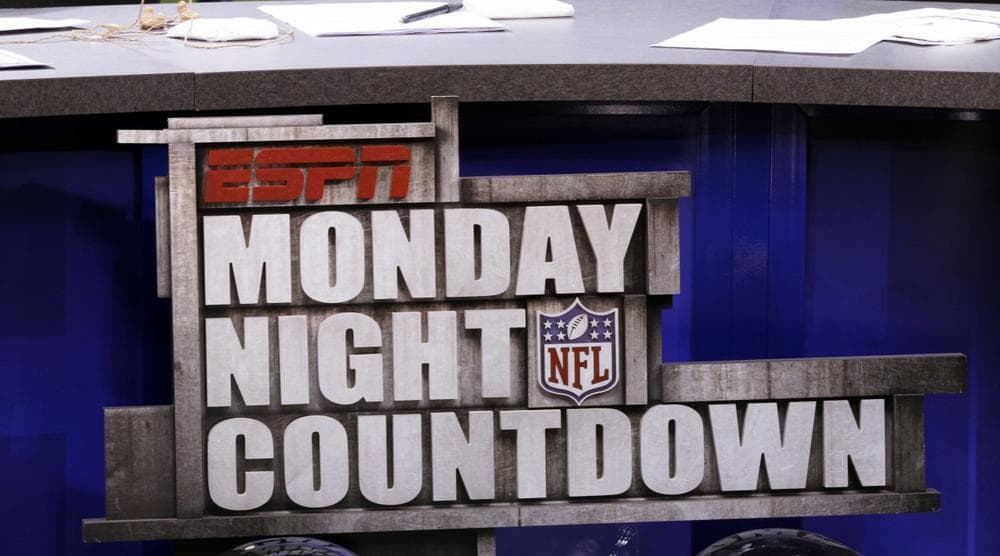Advertisement
In The News
Sports And The Media: A Conflicted Relationship
Resume
Just over a week before the NFL settled with its former players, the league's broadcast partner, ESPN, removed its name from a Frontline documentary examining the sport's concussion crisis.
It wasn't just the soundtrack by Jay Z and Rihanna that caught the attention of ESPN President John Skipper. He told ESPN's ombudsman Robert Lipsyte that Frontline's trailer was "sensational", especially this quote:
“I'm really wondering where this stops,” said Boston University neuropathologist Ann McKee. “I'm really wondering if every football player doesn't have this.”
Robert Lipsyte declined to speak with Only A Game for this story, as did Frontline, but James Andrew Miller, author of Those Guys Have All the Fun: Inside the World of ESPN believes the real catalyst for Frontline and ESPN's quickie divorce was a lunch meeting between the top executives at ESPN and the NFL.
It is really a natural conflict at ESPN between church and state.
Richard Deitsch
Miller wrote about the lunch for The New York Times. He says ESPN has produced many hard hitting stories that have displeased its broadcast partners, including its most powerful partner, the NFL. But, this time, ESPN backed down. And this time, everyone was watching.
“This is some of the most profound issues in the sports world and I would dare say the medical world. We're swimming in the deep end of the pool here,” he said.
Richard Deitsch, who writes about the media for Sports Illustrated, is also concerned. “It is really a natural conflict at ESPN between church and state,” he said.
Deitsch has no doubt ESPN will continue to do hard hitting coverage of the concussion issue.
“It's not that it’s a total elimination of coverage, but it can mitigate the toughest of the tough stories if there's a partner who sort of owns the press and owns the news,” he said.
If you want to really discuss a partner who owns the news, Tim Marchman, Deputy Editor at Deadspin, says to look no further than the coverage of the Ultimate Fighting Championship on Fox Sports 1. What's wrong with that relationship?
“I wouldn't even know where to start,” he said.
UFC president Dana White has already appeared on Fox Sports Live, the brand new channel's nightly interview show, more than once. He's treated as a friend, not a league president whose assertions must be fact checked. Marchman says, that's because there's no one employed at Fox Sports 1 to cover the UFC as a news story.
“Fox Sports has subcontracted UFC's coverage to UFC,” Marchman said. “They are the league and the team and the broadcast entity, all rolled up into one.”
Deadspin, along with along with ESPN's Josh Gross and Sports Illustrated's Loretta Hunt, has been banned from UFC's press row for coverage the league didn't like. But, at least UFC has a press row. Marchman says if some team owners have their way, that won't always be the case.
“Mark Cuban's talked about the essential uselessness of beat writers to him as a sports promoter — that he would in many ways be better off just hiring his own, have them cover the Dallas Mavericks on his behalf,” Marchman explained.
[sidebar title="A Complex Past" width="320" align="right"]Bill Littlefield weighs in on the historically complicated relationship between the media and pro sports teams.[/sidebar]Uncomfortable with a team owner hiring his own journalists? How about one who buys his own newspaper? Red Sox principal owner John Henry agreed to purchase The Boston Globe in early August, sending former Globe columnist Tony Massarotti into fits on his sport talk radio show, Felger and Mazz.
“It's like you know from a baseball standpoint, the Globe just became Pravda,” he said.
“Yeah, you know it really isn't the coverage of the Red Sox as a baseball team,” said Dan Kennedy, an assistant professor of journalism at Northeastern university and a frequent media commentator. "I'm not worried that suddenly trades the Red Sox make will be evaluated in a more positive light, but the Red Sox are really a very significant business and civic player in Boston.”
Kennedy believes everyone will be watching to make sure the Globe doesn't waver in its journalistic pursuit of the Red Sox, a lesson the newspaper can learn from ESPN.
“People often talk about there's not enough diversity in the media,” he said. “In fact sometimes in moments like this you see that there's more diversity than maybe we realized because this has been widely reported by other media. It's been a real negative for ESPN.”
A negative for ESPN, but everyone seems to agree all this publicity has been pretty good for Frontline. And, when the documentary is released in October as 'the film ESPN didn't want you to see' the incident will serve as a powerful reminder to all of those in sports journalism: who pays whom and who owns what is – and will continue to be – under scrutiny.
This segment aired on August 31, 2013.
